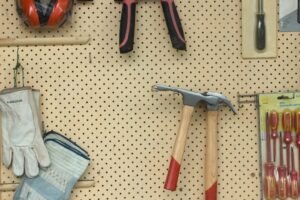When working with tools, safety should be the primary concern. Essential safety equipment includes safety goggles to protect eyes from debris and particles, ear protection to prevent hearing damage from loud tools, work gloves to guard against cuts and splinters, dust masks to avoid inhaling harmful particles, and slip-resistant work boots for stability and protection from heavy objects and sharp tools. A well-stocked first aid kit is crucial for addressing minor injuries and should contain bandages, antiseptic ointment, pain relievers, and other necessary medical supplies.
Additionally, keeping a fire extinguisher in the workshop is advisable for emergency situations. Prioritizing safety gear and being prepared for potential accidents helps create a secure and efficient working environment in the workshop.
Key Takeaways
- Safety gear is essential when working with tools, including gloves, safety glasses, and ear protection.
- Measuring and marking tools such as tape measures and chalk lines are crucial for accurate and precise cuts and placements.
- Cutting tools like circular saws and jigsaws are necessary for cutting decking materials to size.
- Fastening tools like drills and screwdrivers are needed to secure decking materials in place.
- Leveling and plumb tools like levels and plumb bobs are important for ensuring the decking is installed evenly and straight.
- Decking materials can include wood, composite, or PVC options, each with their own benefits and considerations.
- Finishing tools like sanders and brushes are used to smooth out surfaces and apply finishes to decking materials.
Measuring and Marking Tools
Essential Measuring Tools
A tape measure is a fundamental tool for taking measurements of wood and other materials. It’s important to invest in a high-quality tape measure that is durable and provides accurate measurements. A combination square is another essential tool for marking 90-degree angles and checking for squareness in your workpieces. This versatile tool can also be used as a depth gauge and a height gauge for setting up power tools.
Accurate Marking Tools
In addition to these basic measuring tools, a marking knife or a sharp pencil is essential for making accurate markings on wood. A marking knife provides a precise and clean line, while a sharp pencil is versatile and easy to use. A marking gauge is also useful for making consistent and accurate markings along the grain of the wood.
Investing in Quality Tools
By investing in high-quality measuring and marking tools, you can ensure that your woodworking projects are precise and well-executed.
Cutting Tools

Cutting tools are essential for shaping and sizing wood for woodworking projects. A high-quality handsaw is a fundamental cutting tool that every woodworker should have in their workshop. There are various types of handsaws available, including crosscut saws, rip saws, and dovetail saws, each designed for specific cutting tasks.
A backsaw is another essential cutting tool that is used for making precise and accurate cuts, especially for joinery work. It has a rigid back that helps to keep the blade straight during cuts. In addition to handsaws, power tools such as circular saws, jigsaws, and table saws are essential for cutting large pieces of wood quickly and accurately.
These power tools are versatile and can be used for a wide range of cutting tasks. It’s important to use these power tools with caution and always follow safety guidelines to prevent accidents and injuries. By having a variety of cutting tools in your workshop, you can ensure that you have the right tool for any cutting task that comes your way.
Fastening Tools
| Tool Type | Usage | Advantages |
|---|---|---|
| Screwdriver | Tightening or loosening screws | Manual control, various sizes |
| Hammer Tacker | Attaching materials with staples | Quick and efficient |
| Nail Gun | Driving nails into wood or other materials | Fast and precise |
Fastening tools are essential for joining wood together to create strong and durable woodworking projects. A hammer is a fundamental fastening tool that is used for driving nails and brads into wood. It’s important to invest in a high-quality hammer with a comfortable grip and a durable head for efficient fastening.
A set of screwdrivers is also essential for driving screws into wood and other materials. There are various types of screwdrivers available, including flathead and Phillips head screwdrivers, each designed for specific screw types. In addition to hammers and screwdrivers, a cordless drill is an essential fastening tool that provides versatility and efficiency in driving screws and drilling holes.
It’s important to invest in a high-quality cordless drill with variable speed settings and a comfortable grip for extended use. A set of clamps is also essential for holding wood pieces together while the glue dries or while fastening with screws or nails. By having a variety of fastening tools in your workshop, you can ensure that you have the right tool for any fastening task.
Leveling and Plumb Tools
Leveling and plumb tools are essential for ensuring that woodworking projects are straight, level, and plumb. A spirit level is a fundamental leveling tool that is used to check if surfaces are level or plumb. It’s important to invest in a high-quality spirit level with accurate vials for precise measurements.
A laser level is another essential leveling tool that provides accurate horizontal and vertical lines for leveling and alignment tasks. In addition to spirit levels and laser levels, a plumb bob is an essential tool for checking if surfaces are plumb or vertical. It consists of a weighted metal point attached to a string, which provides a precise vertical reference line.
A framing square is also essential for checking if corners are square and for laying out perpendicular lines on wood surfaces. By having a variety of leveling and plumb tools in your workshop, you can ensure that your woodworking projects are straight, level, and plumb.
Decking Materials

Pressure-Treated Lumber: A Popular Choice
Pressure-treated lumber is one of the most popular decking materials due to its affordability and resistance to rot and decay. It’s essential to choose high-quality pressure-treated lumber that has been properly treated to ensure durability and longevity.
Natural Wood Decking Options
Cedar and redwood are also popular decking materials due to their natural resistance to rot and decay, as well as their attractive appearance. These natural wood options offer a unique aesthetic and can add warmth to your outdoor space.
Composite Decking: A Low-Maintenance Alternative
In addition to natural wood decking materials, composite decking is becoming increasingly popular due to its low maintenance requirements and long lifespan. Composite decking is made from a combination of wood fibers and plastic, providing durability and resistance to rot, decay, and insect damage. It’s crucial to choose high-quality composite decking that is resistant to fading, staining, and scratching for long-term performance.
Finishing Tools
Finishing tools are essential for adding the final touches to woodworking projects, creating smooth surfaces, and enhancing the appearance of wood surfaces. Sandpaper is a fundamental finishing tool that is used for smoothing rough wood surfaces and removing imperfections. It’s important to invest in high-quality sandpaper with various grits for different sanding tasks, from coarse sandpaper for initial sanding to fine sandpaper for finishing touches.
In addition to sandpaper, a random orbital sander is an essential finishing tool that provides efficient and uniform sanding results on large wood surfaces. It’s important to choose a random orbital sander with variable speed settings and a comfortable grip for extended use. A block plane is also essential for smoothing wood surfaces, removing sharp edges, and fitting joints together.
By having a variety of finishing tools in your workshop, you can ensure that your woodworking projects have smooth surfaces and a professional finish.
If you’re planning to build a deck, you’ll need the right tools for the job. Check out this article for tips on the essential tools needed to build a deck and ensure a successful project.
FAQs
What are the essential tools needed to build a deck?
The essential tools needed to build a deck include a circular saw, power drill, hammer, tape measure, level, framing square, post hole digger, shovel, and safety gear such as gloves and safety glasses.
Do I need any specialized tools for building a deck?
While the essential tools listed above are commonly used for building a deck, some specialized tools such as a deck board jig, deck building software, and a pneumatic nail gun can also be helpful for certain aspects of the project.
Can I rent the tools needed to build a deck?
Yes, many hardware stores and home improvement centers offer tool rental services, allowing you to rent the necessary tools for building a deck rather than purchasing them outright.
Are there any safety precautions I should take when using these tools?
Yes, it is important to wear appropriate safety gear such as gloves and safety glasses when using power tools. Additionally, always follow the manufacturer’s instructions and safety guidelines for each tool to minimize the risk of accidents or injuries.
Do I need any specific tools for deck maintenance after it’s built?
For deck maintenance, additional tools such as a pressure washer, paintbrushes or rollers, and a sander may be needed depending on the type of maintenance required, such as cleaning, staining, or refinishing the deck.




















+ There are no comments
Add yours